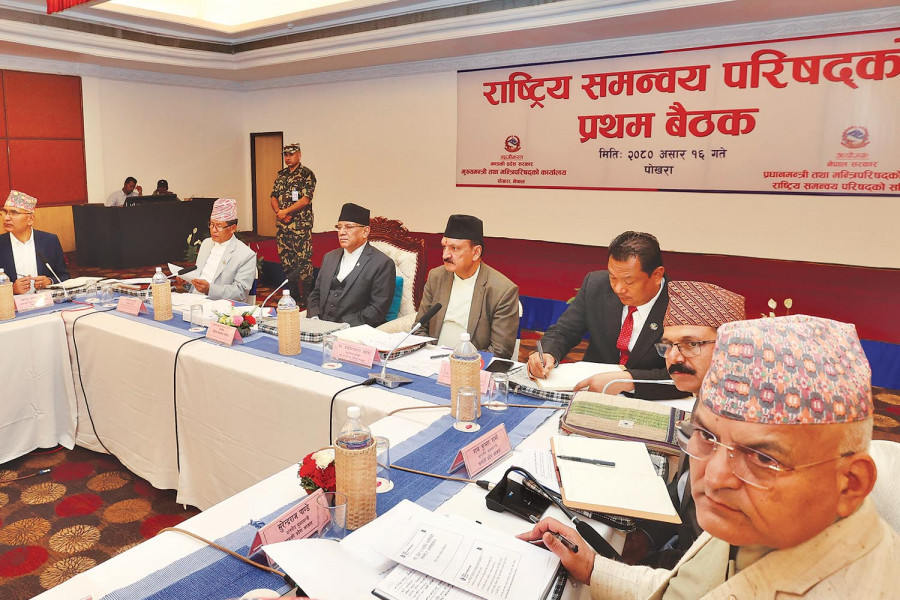Editorial
Council of hope
The federal system needs mechanisms like national and provincial coordination councils to be effective.
Prime Minister Pushpa Kamal Dahal has taken a vital step on the road to full-fledged implementation of federalism. He did so by attending a meeting of chief ministers in Pokhara organised by Gandaki Chief Minister Surendra Raj Pandey on Friday and convening the National Coordination Council meeting in the tourist city on Saturday. The second meeting, which was chaired by the prime minister, was convened for the very first time. The Federal, Provincial and Local Levels (Coordination and Inter-relations) Act, 2020 provisions a National Coordination Council headed by the prime minister. Though the Constitution in its Article 234 envisioned such an inter-state body to ensure better coordination and cooperation between the three tiers of governments, it took five years for the Act’s formulation. It would be three more years before Saturday’s meeting could be convened. Encouragingly, most of its participants appeared happy with the prime minister’s assurances and presentation.
The gathering was attended by chief ministers, key ministers from the federal Cabinet, a leader of the main opposition party and chiefs or representatives from local units from across the country. They shared their ideas, grievances, possible solutions to their problems and heard each other’s views at the common platform. The participants were right to discuss issues of duplication, overlapping and interference in each other's jurisdictions. To an extent, this is natural with our federal system still in its infancy. It has just been over seven years since the country took the federal path, with mutual cooperation, coordination and coexistence as its guiding mantras.
So while they work independently and autonomously in various areas, they also need to join hands with their counterpart units or other layers of the federal system on many issues. Coordination is even more necessary when working on the list of concurrent powers of federation, state and local level as provided in Schedule-9 of the constitution. Events like the Sunday gathering will thus promote mutual understanding and a spirit of cooperation on specific issues, especially the knottier ones.
But the prime minister and other stakeholders should not forget the initiative will yield positive results only if it is institutionalised. The chief ministers also need to be more responsible. Section 24 of the Act has envisioned Province Coordination Councils headed by chief ministers to ensure better coordination and relations between the province and local units and districts in their respective provinces. The chief ministers have to regularly convene the province council meetings (which they don’t) and promptly resolve issues that fall under their jurisdiction.
A section of the society sees provinces as comprising an unwanted layer of the federal setup. The idea of a federal system without a provincial level, or with weaker provinces, is faulty though. To make the federal system work, all three tiers should have the autonomy, independence and sufficient rights to work in the areas under their jurisdiction. But it is also true that most of our provinces have failed to prove their own relevance. Dissatisfaction over the provinces’ performance is palpable and some public concern is valid. They must work harder to assure the sceptical public. The federal system will be strengthened only if institutional mechanisms like the national and provincial coordination councils are effective. We would like to believe that the Pokhara National Coordination Council meeting will be a stepping stone towards that goal.




 10.12°C Kathmandu
10.12°C Kathmandu













